An Irish American family go back to 1883 to discover what’s most important in the present.
What could be more parental than to wish to show your children how good they have it today? To take your family into the past and give them a taste of real life, when necessity stared you straight in the face and your mettle was tested by the sometimes–cruel vicissitudes of nature?
For Gordon Clune, the son of an Irish father, and Adrienne Clune, an immigrant from County Wicklow, fantasy became a reality when their family was picked out of 5000 applicants to “go back” 118 years and spend five months as homesteaders in Montana.
The premise of the six–hour PBS “reality program” was simple: send three families from modern times back to 1883, set up rigorous rules to make the experience as authentic as possible, turn the cameras on and see what happens. The resulting program, Frontier House, was a viewer and ratings hit when it premiered last April and it’s easy to see why. Frontier House satisfied a strong American impulse to find out what it would really be like to “return to nature,” or “live like our ancestors,” while providing a compelling narrative of three families determination to survive in a stripped down and grueling environment – no washing machine or microwave oven – no comer store for late night snacks – no toilet paper – no gas-powered saws for cutting wood – no modern medicines. But more significantly, while the producers of the show claimed part of their intent was to show the realities of the American movement west across the country, for the Clunes, the five months in 1883 provided a backdrop for exploring some of life’s most spiritually challenging questions.
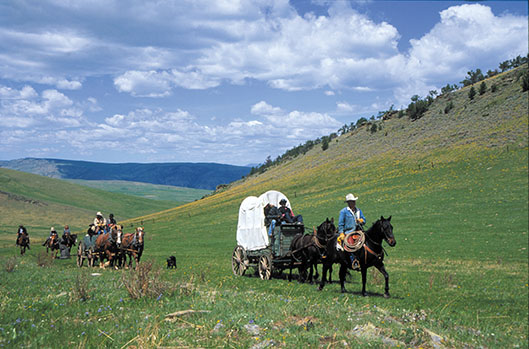
“Homesteaders” is not the first image that comes to mind when meeting Gordon and Adrienne Clune and their three children, Aine, 16, Justin, 13 and Connor, 10. Their spacious home on a hill overlooking miles of Malibu coastline is the quintessential picture of California prosperity. Gordon, the president of his own engineering and manufacturing company, has provided his family with a comfortable lifestyle. No one spends hours hand washing clothes in a nearby stream, a regular weekly chore on the homestead. But as with many Americans who have done well, scratching beneath the surface reveals a complex history.
Gordon, now 42, whose father came from County Wicklow, spent five years on a farm in Manitoba, Canada, while Adrienne grew up on a farm in County Wicklow, an experience that she says gave her “an appreciation of nature and the closeness of the survival instinct.”
Both believe that their Irish and farming backgrounds provided a precious resource they drew upon when things became so arduous that the impulse to pick up and return home was difficult to repress. “Even though I like the comforts of modern life,” Adrienne reflected, “I knew I could make it because where I came from was a tough fanning life. You don’t make it farming in Ireland unless you respect nature, your surroundings and your neighbors.”
What drew Gordon to apply for the project was his desire to test his skills as a backwoods “provider” and to pay proper respect to his pioneer ancestors. “The pilgrims, homesteaders and Irish immigrants had a great spirit that has become part of the American ethos. They left everything in pursuit of a better world, and I relate to that attitude as most Americans do.”
The six one-hour episodes, culled from over five hundred hours of footage, reveal the strength and tenacity that it took for the homesteaders to make it. In reality, the good majority of those who took advantage of the free land granted under the Homestead Act of 1862, did not last the five years required to gain legal ownership of the land. Watching the Clunes carve out an existence from the unforgiving surroundings – building their own log cabin – growing their own food – managing sometimes uncooperative livestock – and fighting off animal predators and the threat of local cattle ranchers overrunning their land – provides a glimpse of why most original homesteaders hightailed it back to the city.
The Clune family’s adventure almost ended abruptly and tragically before they got started. A team of horses pulling their wagon of supplies towards their eventual home was spooked at the beginning of the trail. It took off across a rough field at full speed with the driver and their son Conor barely holding on. The wagon broke apart, Conor was tossed and the horses almost trampled Adrienne, whose old-fashioned headdress shielded her face from the sun but also blocked her peripheral vision. No one was hurt, but it was an early indication of how quickly things could go drastically wrong on the frontier.
It also became apparent very quickly that feeding a family of six people – a cousin, Tracy, was brought along to accompany their daughter Aine – while the rules prohibited hunting game, would not be easy. Chopping logs for the stove and fireplace was a daily necessity, at one point causing a partial paralysis in one of Gordon’s arms. There was rarely a moment when Adrienne was not churning butter, fixing breakfast, lunch or dinner, preparing to bake or washing clothes. Flies were everywhere, mice took over the log cabin at night running through the girls’ and Adrienne’s hair, and everyone slept in the same room. Romance was out of the question.
For several weeks the family seemed emotionally drained and on the verge of physical breakdown. The chickens refused to lay eggs, meat was scarce, and their diet was reduced to cornbread and beans. They quickly lost weight, with Gordon leading the way – dropping 35 pounds.
When Adrienne bartered baked goods for “protein” in an area that was off-limits, the family came in for intense on-camera criticism from the Glenns, another participating family, for pushing beyond the rules of authenticity that the producers had set up. The result was great television.
As time went on and the Clunes got the hang of homesteading, their burden was lightened. The chickens began to lay, and Gordon honed his entrepreneurial skills by brewing moonshine liquor which he sold to the grocery store a day’s ride from the homestead. He fermented corn meal, wild apples and chokecherries that were in abundance in the area. Working the still is vivid in Gordon’s memory. “I distilled the liquor three times, lightened it with some berry juice and sold it to the general store as a cure–all. “I’m not much of a drinker,” he added, “but I’d like to make that stuff again.”
Adrienne also added to the desperately needed cash flow. She made $50, a good deal of money in 1883, by making preserves and syrup out of chokecherries and used her considerable baking skills to make muffins, scones and breads that she traded and sold at the store.
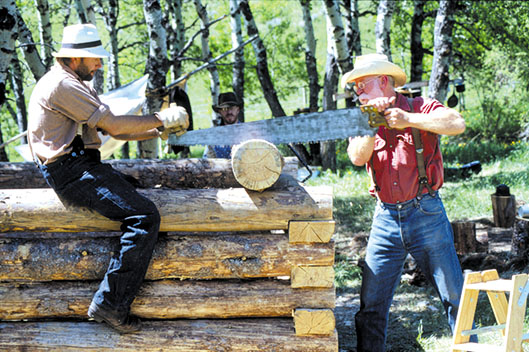
Her baking skills were not acquired easily. Before moving to the United States with her husband, Adrienne studied French cookery and food science at St. Catherine’s College in Blackrock, Dublin and spent time in the provincial areas of Italy and France studying with local cooks. On the homestead she quickly learned the subtleties of cooking with a wood–burning stove, and turning cow’s milk into butter. “Churning butter actually became one of my favorite activities,” she recalls. “I would skim the cream off the milk every morning and sit by the creek working the chum. I loved the sound and the rhythm of it.” Now she even knows that the optimum temperature for making butter is between 55 and 65 degrees.
One of her most enjoyable experiences, she says, was baking a wedding cake for Nate and Kristen Brooks who were married on the frontier. The wedding came at a difficult time for the Clunes. The chickens were on strike so Adrienne had to purchase a dozen eggs from the store for the cake and icing. But it is clear in the program the care and creativity that went into making the cake and icing from scratch. She prepared the cake over three days, churning the butter, pounding raw sugar into powder with a mortar and pestle, and making a piping bag for the icing from scraps of brown paper. Son Justin pitched in, fashioning a much–needed whisk out of bailing wire. The cake was decorated with wildflowers from the area, all of them, Adrienne enthusiastically pointing out, associated with love and romance. “And the ancient Celts believed that Yarrow, one of the flowers we used, kept couples happily married,” she says.
Happily married though they are, Nate and Kristen are soon reminded of the conflict over race, class and property that shaped the social structure as Americans moved west. A one–room schoolhouse is fashioned out of an abandoned shed and a local teacher is hired, but because Nate is African-American and Kristen is Caucasian, they are told that a child born of their union would not have been permitted to attend school in Montana in 1883.
School, however, proves a welcome respite from chores for the Clune children, especially for Aine, a keen musician, who learns to play the guitar.
Aine and Tracy were responsible for milking the cows twice a day. In one scene from the series they are shown trudging through a freak May snowstorm, wet from shoes to hair. Their homemade dresses are still damp from being washed the day before. Their cow Blanca, who they took to calling “Blanca Burger” because of her fat thighs and the fantasies they had about turning her into hamburger, had escaped to another family’s homestead. It was their job to find it, milk it and drag it home, skills they wouldn’t have learned in West Los Angeles shopping malls. They are reduced to tears when neighbor and fellow homesteader Mark Glenn tells them to get off off his land.
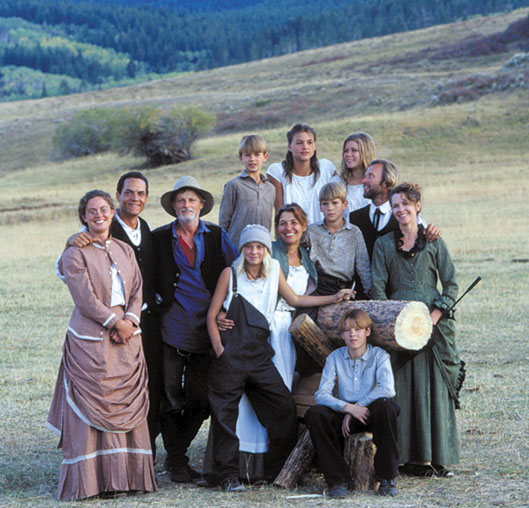
From her home in Malibu where she’s working on getting her California tan back, Aine reflects on her homesteading experience. “I have a Celtic magic book. And it says the name Aine comes from the ancient past and was a woman who was good at cattle raising and farming,” she says proudly.
Aine, who left a boyfriend to go back in time, feels proud and mentally tougher as a result of the experience. “I began to realize the peer pressure I’m under in modern life, the push from television and the media to go along with the crowd and look and act the same. Back in 1883 nature became part of my life and I lived it. I can walk in the woods now and not be afraid of wolves or bears.”
Every member of the Clune family regards the difficulty they faced as somehow transforming – a layer of depth and insight not always grasped in the rush of urban life.
The boys Justin and Conor both feel that the experience brought their family closer together. Justin, while only 13 years old, has a keen sociological insight about the dynamics of modern family life. “I never saw my father work until we were out there [in Montana]. It was really great to see him work and to work with him to help provide for the family. My understanding and closeness to my family is greater now.”
Conor, the youngest of the family, says he does more chores now and eats less junk food. “Canned fruit was a luxury on the homestead,” he says. Today he hones his hunting skills with a pellet gun in the backyard, but in 1883 his favorite activity was target practice with the primitive bows and arrows they made. Looking back he feels he “grew up a bit out there,” adding that he didn’t even mind the outdoor toilet, which was “better than most gas station bathrooms that we use today.”
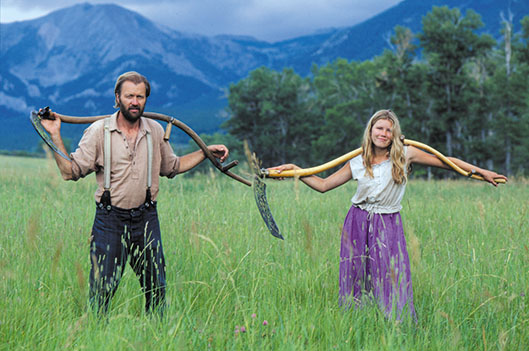
But the main interpreters of the experience, the ones responsible for gleaning the deeper lessons of Frontier House and translating them in their own way to the rest of the family, are Gordon and Adrienne. Adrienne, who taught history for a few years before making raising three children her priority, discovered profound political, historical and spiritual truths in the undertaking. She gained a deep respect for the women of the frontier whose stories have often been overlooked by historians’ myopic focus on cowboys, ranchers and outlaws. “It’s no accident that the first American congresswoman came from Montana. Every woman that went to the frontier was tough. You worked right alongside the men and you proved yourself by chopping wood or doing whatever it took to survive.”
Despite the fact that she believes there “is so much excess” in modern life, Adrienne also came away from the homestead experience with an awareness of the relationship between technology and the “liberation” of women from unremitting toil. “The whole women’s rights movement would not have happened without modern technology,” she observes. “You have to have the release from constant work to express your new-found freedom.”
Upon returning home, both Adrienne and Gordon also found themselves re-thinking their ideas of nature, the definition of hunger and looking more closely at the intimacies and rituals of family life in contemporary America. Growing up on a farm in Ireland gave Adrienne some understanding of nature’s impact on daily life. But the five months on the homestead also sharpened her awareness of its power and unpredictable force. “You co–exist with nature in ways you never expected, which is a very spiritual experience. But you also have to respect its power and ultimately how insignificant we are in the whole scheme of things.”
For Gordon, the confrontation with nature brought out the same sense of humility and awe – the thunder and dark clouds gathering in the adjacent valley was a “reminder of God’s existence.” But he also felt a strong, perhaps more male need to control nature to the extent that he could. It was partly out of a pragmatic necessity to help himself and his family, but also the result of an enduring human compulsion to exert man’s power to dominate; to bend nature’s to man’s will. “I felt a sick kind of thrill in fencing the property from roaming cattle and in damming the spring for irrigation,” he says, pondering the deep source of his own impulses. “But I also took pride in it, this desire to be Godlike, to curb nature.”
Back in the modern world, not much has changed externally for the Clune family. They have a nice pool in the backyard, the kids are back in school, and most of the old routines have reasserted themselves. But there is the sense that the gifts that they brought back from the past have subtly but inexorably altered the way they view and live life. Adrienne believes that her view of food and hunger has “changed forever.” She has greater empathy for those who struggle daily for food, and she thinks more about the tragedy and consequences of the famine in the country of her birth. And her children now say “thank you” when she prepares a meal.
Gordon now makes it home from work more often to spend time watching the sunset with his family, realizing that time and the growth of children have a way of slipping by unnoticed, like the billowy Montana clouds he watched for five months. He has made a point of bringing home wood to chop with his sons and plans to buy an old car that they can rebuild together. And the more he reflects on the Montana experience, the more he realizes how important his wife is to him. “I’m in awe of Adrienne,” he says smiling, sitting at a table full of freshly baked scones and brown bread. “Out there I tried to do everything I could to make her life more comfortable because I appreciate so much her being with me. And I got her into the thing,” he laughs.
As Conor takes target practice with his pellet gun outside, and Aine suns herself by the pool trying to add to the “Montana tan” that goes only three–quarters of the way up her arms, Gordon and Adrienne try to sum up a family experience that many Americans wish they could have.
“During our homestead days I learned that what is most important in life is free.” Adrienne says. “Good weather, eggs from the chickens, watching my children walking across a meadow of wild flowers, and having my family around me”
“I would do it again in a heartbeat,” Gordon says, “but with no movie cameras.” ♦

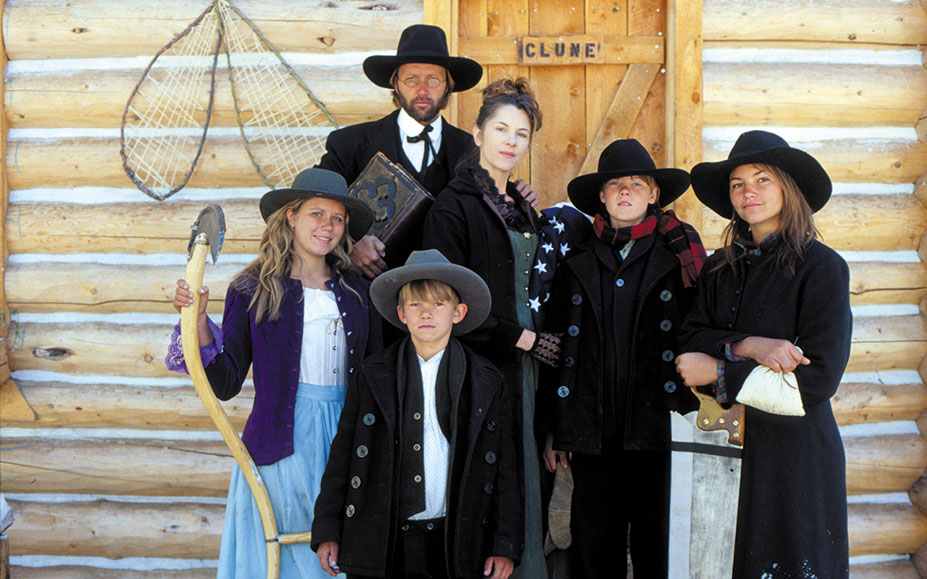
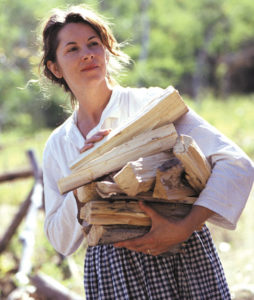
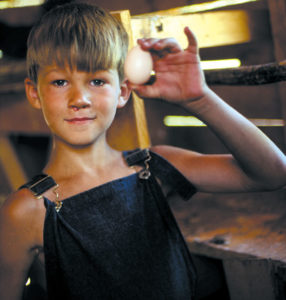
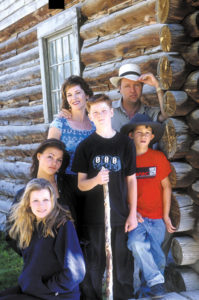
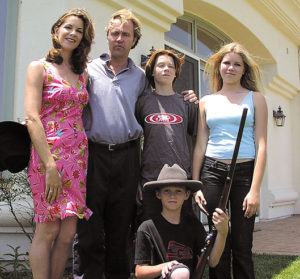
Leave a Reply